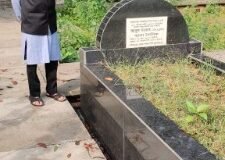Rayhan Ahmed Topader:
More than 700,000 members fled to neighbouring Bangladesh following a reported military crackdown in August 2017 during which numerous alleged human rights abuses were committed. According to news reports, around 600,000 Rohingya remain inside the country, and remain extremely vulnerable to attacks and persecution, said the court. In its ruling, the ICJ imposed provisional measures against Myanmar, ordering the country to comply with obligations under the Convention on the Prevention and Punishment of the Crime of Genocide. Myanmar is urged to take all measures within its power to prevent the killing of Rohingya, or causing bodily or mental harm to members of the group, including by the military or any irregular armed units. The country also has to submit a report to the ICJ within four months, with additional reports due every six months until a final decision on the case is rendered by the Court. Across the crowded camps in Cox’s Bazar, where more than 700,000 Rohingya fled to neighbouring Bangladesh in 2017, the result was welcomed by those who were able to follow the news. Internet restrictions across the camps are understood to have prevented many from doing so. Khin Maung, 24, founder of the Rohingya Youth Association, said: People are discussing and talking to each other. People did not sleep the whole night. This is one of the exciting things for us. If the court did not decide provisional measures, our life.
In every way we are limited. Our children, the upcoming generation, I am very sorry there is no school for them. I am crying for that issue. There are religious leaders and community leaders talking to each other. Good news will spread quickly around the camps.Mohammed Arfaat, a Rohingya peace builder, actor and singer, described as a historic day. Before I thought we will not get back our rights and justice from the Myanmar government, he said. After a long time, I’m really happy for the Gambia and other people who are doing hard work for us. Finally, what the Rohingyas have been crying out about and what Bangladesh has been saying at the top of its voice has been recognised at the World Court. We hope the whole world is now listening at last. The International Court of Justice (ICJ) in The Hague, in a momentous decision, ordered Myanmar to carry out emergency, “provisional” measures to protect its Rohingya population from genocidal violence and preserve evidence of alleged crimes against them. Declaring there is prima facie evidence of breaches of the 1948 genocide convention, the court found that the Rohingyas remaining in Myanmar were “extremely vulnerable” to violence at the hands of Myanmar’s military. And, therefore, the panel of 17 judges, in its unanimous ruling, asked Myanmar to report back to it within four weeks on the actions it has taken to prevent any serious harm being done to the Rohingyas-and every six weeks thenceforth. We owe a debt of gratitude to The Gambia for bringing this matter to the attention of the ICJ.
Despite the fact that the ruling dealt only with the Gambia’s request for so-called preliminary measures, the equivalent of a restraining order for states-not the court’s final decision-it nevertheless could pave the way for Myanmar to finally be held accountable for its atrocities against the Rohingyas. Sadly, some of these atrocities could have been prevented, had the international community acted faster to protect the Rohingyas. This genocide, which the world is yet to recognise, is a good example of how so-called proponents of justice and fairness are unwilling to recognise the most egregious crimes against a helpless population, for their own convenience. Bangladesh has even had to witness two of its closest friends, China and India, refusing to condemn the seriousness of the crimes Myanmar committed against the Rohingyas. India, with which Bangladesh’s relationship is at an all-time high, as both sides never fail to proclaim, has also refused to acknowledge the reality which was happening next door to them. Now that what Bangladesh has been saying has found a voice at the World Court, we once again appeal to the entire world to step up its effort to assist Bangladesh in protecting the Rohingyas, and to hold Myanmar accountable for its many crimes that must not be ignored any longer. Myanmar has been ordered by the United Nations’ highest court to prevent genocidal violence against its Rohingya Muslim minority and preserve any evidence of past crimes.
In a momentous and unanimous decision, the international court of justice (ICJ) in The Hague imposed emergency provisional measures on the country-intervening in its domestic affairs by instructing the government of Aung San Suu Kyi to respect the requirements of the 1948 genocide convention. Declaring that there was prima facie evidence of breaches of the convention, the court warned that the estimated 600,000 Rohingya remaining in Myanmar were extremely vulnerable to attacks by the military The ruling amounts to outright rejection of the Nobel peace prize winner Aung San Suu Kyi’s defence of her country against accusations of systematic human rights abuses and war crimes during a three-day hearing at the ICJ last month. Even the judge nominated by Myanmar for the hearing voted against the country. The ICJ’s orders are binding on Myanmar and create legal obligations that must be enforced. The provisional measures imposed by the court require the government to prevent genocidal acts, ensure military and police forces do not commit genocide, preserve evidence of genocidal acts and report back on its compliance within four months.The orders are automatically sent to the UN security council, where Myanmar’s response will be assessed. The country receives diplomatic support from China, which is one of the five permanent members of the council. The case was brought to the ICJ by the Gambia, a predominantly Muslim west African state that alleges Myanmar has breached the genocide convention, which was enacted after the Holocaust.
The decision was read out by the court president, Abdulqawi Yusuf. Alongside him sat 16 of the 17 judges who heard the case, all wearing black robes and white lace cravats. For just over an hour, Yusuf read out the ICJ’s findings in a clear and deliberate speech that culminated in the court’s four remarkable conclusions. A Rohingya community in Kutupalong watches the sentence delivery and holds thank you notes for the Gambia, which brought the case against Myanmar to the ICJ Recently, ruling dealt only with the Gambia’s request for provisional measures, the equivalent of a restraining order for states. A Myanmar government-appointed panel, the Independent Commission of Enquiry, said on Monday it had found no evidence of genocide The ICJ only hears cases brought by one state against another. It has jurisdiction to hear complaints of breaches of the genocide convention even if the aggrieved state is not directly affected by violence or refugees Executive director Dr. Adams, of the Global Centre for the Responsibility to Protect, said: This is the first step on a path to justice for the Rohingya. I hope that all members of the UN security council will uphold their moral and political obligation to ensure that the provisional measures ordered by the court are fully implemented. Those responsible for genocide are still in power in Myanmar. Justice has been delayed but can no longer be denied. Presiding judge Abdulqawi Ahmed Yusuf said Myanmar must.
Take all measures within its power to prevent the commission of all acts” described by the convention. These include killing members of the group and “deliberately inflicting on the group conditions of life calculated to bring about its physical destruction in whole or in part.The panel of 17 judges also was of the opinion that the Rohingya in Myanmar remain extremely vulnerable,” said Yusuf. Myanmar is required to report back to the ICJ within four months and then every six months until after the full case is heard. Hearing the full case could take years. The ICJ’s ruling is binding, however, it has no powers to implement the provisional measures in Myanmar. The complaint is one of the first attempts to use the international justice system to help the Rohingya people. The ICJ imposed provisional measures on Serbia in relation to preventing genocide in the 1990s but this is the first time they have been unanimous and so wide-ranging. Even the ad hoc judge chosen by Myanmar expressed judgement against the country.
Writer and Columnist
 Weekly Bangla Mirror | Bangla Mirror, Bangladeshi news in UK, bangla mirror news
Weekly Bangla Mirror | Bangla Mirror, Bangladeshi news in UK, bangla mirror news





